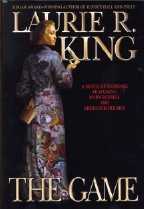The Game
Laurie R. King
Bantam Dell / Random House
US Hardcover First Edition
ISBN 0-553-8094-5
Publication Date: 03-02-2004
368 Pages; $23.95
Date Reviewed: 09-15-04
Reviewed by: Rick Kleffel © 2004

REFERENCES
COLUMNS
|
|
|
The GameLaurie R. KingBantam Dell / Random HouseUS Hardcover First EditionISBN 0-553-8094-5Publication Date: 03-02-2004368 Pages; $23.95Date Reviewed: 09-15-04Reviewed by: Rick Kleffel © 2004 |
|
|
REFERENCES |
COLUMNS |
One of the reasons that writing came into being was so that writers would be able to describe places that their readers had not ever visited. From the earliest times, novels have functioned as travel guides. But it takes more than an exotic location to make a novel. The problem with a strong location is that it requires strong characters to explore it, to make it real for the reader. In almost any given time, India can accurately lay claim to being one of the most exotic lands in the world. In 1924, it was not only exotic it was almost unknown to the West, a land of true mystery. The personalities required to make that landscape come alive must be as vibrant as the landscape itself, and the adventure must match both the landscape and the personalities. It's a tall order, tough to fill.
Luckily for readers, Laurie King launches no less than Mary Russell and her husband Sherlock Holmes on a journey to India in 1924. And though 'The Game', her latest novel, brings back the sleuth and his wife, it's not to solve a mystery. Holmes and Russell are sent off on a mission by Holmes' brother Mycroft. They're spies, and 'The Game' is a rip-roaring period adventure set against the exotic and beautifully rendered backdrop of India on the verge of great change. In fact, Holmes and Russell are out to shape those changes to ensure that if the sun must set on the British Empire in India, it shall at least do so properly, with dignity and decorum. Holmes and Russell, however, manage to elude dignity and decorum, much to the amusement and enjoyment of the readers.
Make no mistake about it. King intends that readers find 'The Game' humorous. No search engine is required, because King front-loads the novel with literate but very funny riffs on the minutia from which Holmes makes his deductions. But the humor grows out of the characters we already know and love; Holmes himself and Mary Russell, every bit Holmes' equal in her ability to entertain the reader. The relationships between the two characters and those around them are skewed from the get-go, as Holmes and Russell first conceal their identities and then don a series of increasingly elaborate disguises. Holmes and Russell have are sent to look for the legendary Kimball O'Hara, known to the world as the Kim of Rudyard Kipling's famous novel. To find him, they will journey to a remote Indian province under the increasingly erratic guidance of an unstable maharajah.
Without doubt, the star character of the first half of the narrative is India itself, as lovingly created by King through deep research and evocative prose. She captures the sights, the smells, the sounds and the foods with deceptive ease as Holmes and Russell journey towards the princely state of Khanpur. Russell is a wonderful first-person narrator, a device that keeps Holmes off-stage for much of the novel, to the novel's benefit. King orchestrates one vivid adventure after another, easily upping the ante and shifting gears when Russell arrives at the Forts, where she is forced to participate in a remarkably rendered bout of pig-sticking. King's writing turns this seemingly barbaric practice to a fever-pitched episode of danger and adventure.
Readers are advised to leave their ratiocination at the door. Though this is a Holmes and Russell novel, it reads like a literary episode of The Avengers, with Russell playing Emma Peel to Holmes' ever-calm John Steed. The accent is on international intrigue, not internal mysteries. King is ever clever, and manages to pack in a number of asides and observations that ring as true for the political realities of today as they do for 1924. This novel is, after all, set in the very mountains that are currently of interest for their ability to shelter international terrorists. When a character observes that arming independent native militias is a dangerous business, lest they turn on their supplier once they've eliminated their enemies, enjoyable high adventure gets a jaunty barb to tip the pig-sticking spear.
Though there are no locked-doors or obscure clues, there are questions to be answered. It may be clear who done it, but the why and the what need answering. And befitting a novel with so many disguises, even who is who gets called into question. Trust Holmes, Russell and King to deliver all the answers, all the solutions and a carefully detailed description of a world now gone that, though vanished, looks a lot like our damaged global disaster-in-waiting. King provides the right mix of action, character and descriptive passages to create a wide-screen movie within the pages of her novel. Readers can relax in their deck chairs and enjoy the spectacle, the characters, the beauty and humor that unfold. 'The Game' is much more than a mere travelogue. It's a first-class ticket.